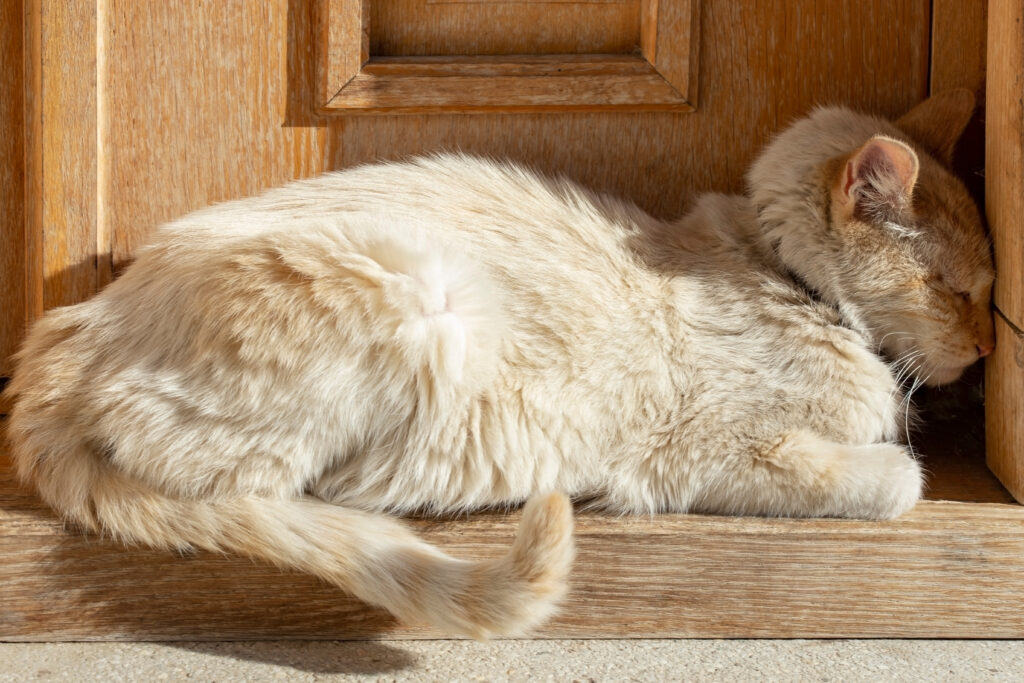If you’re a cat owner, understanding your pet’s behaviors and health signs is key to ensuring they live a happy, healthy life. We’re going to talk about an unusual behavior called cat head pressing. It’s a unique action that can be a sign of something more serious in your cat’s health. If you notice this behavior, it’s important to get in touch with a professional for advice. For pet owners in Keller, Texas, Creekside Pet Care Center is here to help. Feel free to call us at (817) 421-5850 for guidance and support.
What is Cat Head Pressing?
Cat head pressing is when your cat repeatedly presses its head against a wall or other hard surface for no apparent reason. This behavior is different from the affectionate headbutting that cats often do. It’s a continuous action that, when observed, just seems out of the ordinary and potentially concerning.
Spotting the Difference from Normal Behavior
To identify head pressing apart from normal “head-butting” behaviors, look for these signs:
- Constantly pressing the head against hard surfaces
- Doing this for extended periods
- Appearing disoriented or confused while doing it
This behavior is a distinct sign that warrants attention–don’t overlook it; contact our hospital right away so we can assist you!
Head Pressing in Cats: When a Simple Action Signals Something More
Understanding the health implications of head pressing in cats is critical for pet owners. This behavior can be an indicator of several neurological and physiological conditions, some of which require immediate attention. Let’s explore what these could be:
Brain Tumors
When a cat presses its head persistently, it might be a symptom of a brain tumor. These growths can cause increased pressure in the brain, leading to discomfort or pain that the cat tries to alleviate through head pressing.
Infections Affecting the Nervous System
Infections, such as feline infectious peritonitis or feline immunodeficiency virus, can impact the nervous system. Head pressing may be a sign that these infections are affecting your cat’s brain or nervous system.
Exposure to Toxins
Cats may head press if they’ve been exposed to certain toxins. These could include household chemicals, plants toxic to cats, or even certain medications. The toxins can cause brain swelling or other neurological symptoms that result in head pressing.
Head Trauma
If a cat has suffered a head injury, head pressing can be a response to the trauma. Even if the injury seemed minor, it could have caused internal swelling or damage that isn’t immediately visible.
Stroke
Like humans, cats can also suffer from strokes. A stroke can disrupt normal brain function, leading to behaviors like head pressing. This is often accompanied by other symptoms like loss of balance, changes in eyesight, or sudden behavioral changes.
Inflammatory Diseases
Certain inflammatory conditions, such as meningitis or encephalitis, can cause head pressing. These diseases cause inflammation of the brain and/or its surrounding tissues, leading to various neurological symptoms.
Metabolic Disorders
Conditions like liver disease or diabetes can lead to a buildup of toxins in the bloodstream that affect brain function. This can manifest as head pressing, among other symptoms.
Each of these conditions presents a unique set of challenges and requires a specific approach to diagnosis and treatment. For instance, brain tumors might need imaging tests like MRI or CT scans for diagnosis and could require surgical intervention. Infections would need a different approach, possibly involving blood tests and antibiotic or antiviral treatments. Similarly, treatment for exposure to toxins would depend on the type of toxin involved.
It’s also essential to understand that these conditions can have varying degrees of severity. While some might be managed with medication and ongoing care, others could be life-threatening and require emergency treatment.
Monitoring and Responding to Cat Head Pressing
If you just noticed your cat engaging in head pressing, notify your veterinarian and keep a close eye on them. Observe if there are any other changes in their behavior, appetite, and/or energy levels. These observations can be vital to helping your vet make an accurate diagnosis.
Supporting Your Cat’s Health: Next Steps
If your cat is head pressing, the best step is to contact your veterinarian right away. At Creekside Pet Care Center, we’re equipped to help diagnose and treat your cat and if needed, we can partner with a specialist to provide more advanced care. Our team is knowledgeable and compassionate, ensuring your cat gets the treatment they need. Don’t wait if you see signs of head pressing – call us at (817) 421-5850 for an appointment or more information.






